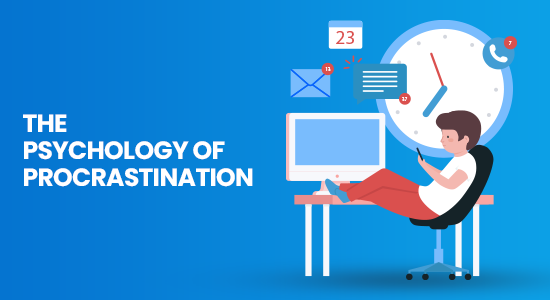Procrastination is a universal challenge that affects people from all walks of life. Whether it’s delaying a work project, postponing a workout, or putting off important decisions, procrastination can be a major obstacle to productivity and success. But why do we procrastinate, even when we know it’s not in our best interest? The answer lies in the complex interplay of psychology, emotions, and habits.
This article explores the psychology behind procrastination, common triggers, and actionable strategies to help you overcome it and unlock your full potential.
What Is Procrastination?
Procrastination is the act of delaying tasks or decisions despite knowing that doing so may have negative consequences. It often involves choosing short-term comfort or gratification over long-term benefits, leading to stress, guilt, and reduced productivity.
The Psychology Behind Procrastination
To understand procrastination, it’s essential to recognize its psychological roots. Research suggests that procrastination is not merely a time management issue but rather an emotional regulation problem. Here’s why it happens:
1. The Role of Emotions
Procrastination is often a response to negative emotions like fear, anxiety, or self-doubt. Tasks that seem overwhelming or unpleasant can trigger these feelings, causing us to avoid them in favor of less stressful activities.
Example: Avoiding a challenging report because of fear of failure leads to binge-watching TV instead.
2. Instant Gratification
Our brains are wired to prioritize immediate rewards over long-term goals, a concept known as present bias. Procrastination occurs when the short-term pleasure of scrolling through social media outweighs the long-term benefits of completing a task.
3. Perfectionism
For some, procrastination stems from perfectionism—the fear of not meeting high standards. This can lead to delaying tasks until the “perfect” time, which rarely comes.
4. Decision Fatigue
Making too many decisions throughout the day can exhaust your mental resources, leaving you unable to start or focus on important tasks.
The Consequences of Procrastination
While procrastination may offer temporary relief, it often leads to long-term drawbacks:
- Increased Stress: Delaying tasks often results in last-minute rushes, creating unnecessary pressure.
- Reduced Quality of Work: Rushed efforts can lead to mistakes and subpar results.
- Lower Self-Esteem: Chronic procrastination can erode self-confidence and create feelings of inadequacy.
Strategies to Overcome Procrastination
Beating procrastination requires addressing its psychological and emotional roots. Here are actionable strategies to help you regain control:
1. Break Tasks into Smaller Steps
Overwhelming tasks are a major trigger for procrastination. Breaking them into smaller, manageable steps can make them feel less daunting.
How to Apply It:
- Instead of writing a 10-page report, start with outlining the main points.
- Set a timer for 15 minutes and commit to working on just one section.
Pro Tip: Celebrate small victories to build momentum and maintain motivation.
2. Prioritize Tasks with the Eisenhower Matrix
The Eisenhower Matrix helps you focus on what’s truly important by categorizing tasks based on urgency and importance.
Steps:
- Divide tasks into four categories: urgent and important, important but not urgent, urgent but not important, and neither.
- Tackle “urgent and important” tasks first to avoid last-minute stress.
Example: Instead of answering non-essential emails first, focus on completing a critical project deadline.
3. Practice Time Blocking
Time blocking involves scheduling specific blocks of time for focused work on particular tasks.
How to Apply It:
- Dedicate 30-60 minutes to one task without distractions.
- Use tools like Google Calendar or apps like Todoist to plan your blocks.
Pro Tip: Include breaks to avoid burnout and maintain focus.
4. Address Emotional Triggers
Since procrastination often stems from negative emotions, it’s important to address the underlying feelings.
Steps:
- Identify what’s causing you to avoid a task (e.g., fear of failure or boredom).
- Reframe your perspective. Instead of thinking, “I have to do this,” say, “I get to do this.”
Example: If writing a report feels overwhelming, remind yourself of the positive impact it will have on your career.
5. Use the “2-Minute Rule”
The 2-Minute Rule helps you start tasks that feel too big or overwhelming by focusing on the smallest possible action.
How It Works:
- If a task takes less than 2 minutes, do it immediately.
- For larger tasks, commit to working on them for just 2 minutes. Often, starting is the hardest part, and you’ll find it easier to continue.
6. Limit Distractions
Distractions are a major enabler of procrastination. Creating a focused environment can help you stay on track.
Steps:
- Turn off notifications on your phone or computer.
- Use apps like Freedom or Focus@Will to block distracting websites.
- Create a dedicated workspace free from clutter and noise.
Example: Instead of working in front of the TV, move to a quiet room with minimal distractions.
7. Practice Self-Compassion
Procrastination often leads to feelings of guilt and shame, which can further perpetuate the cycle. Practicing self-compassion can break this cycle.
How to Apply It:
- Acknowledge your procrastination without judgment. Recognize that it’s a common struggle and doesn’t define your worth.
- Focus on progress, not perfection.
Pro Tip: Remind yourself that small efforts add up over time and that it’s okay to have setbacks.
8. Reward Yourself
Creating a reward system can provide motivation to complete tasks.
Steps:
- Set a specific reward for finishing a task, such as watching an episode of your favorite show or enjoying a treat.
- Tie rewards to milestones to maintain motivation throughout the process.
Example: After completing three hours of focused work, treat yourself to a walk or a coffee break.
When to Seek Professional Help
For some, procrastination may be a symptom of underlying issues like anxiety, ADHD, or depression. If procrastination significantly impacts your daily life and goals, consider seeking help from a therapist or counselor.
Conclusion: Turning Procrastination into Productivity
Procrastination is a natural human tendency, but it doesn’t have to control your life. By understanding the psychological triggers behind procrastination and implementing practical strategies like breaking tasks into smaller steps, addressing emotional triggers, and practicing self-compassion, you can take control of your time and achieve your goals.
Remember, overcoming procrastination is a journey, not a destination. Start small, stay consistent, and celebrate your progress along the way. With effort and patience, you can transform procrastination into productivity and unlock your full potential.
Discover more from Personal Blog of Richard Tong
Subscribe to get the latest posts sent to your email.




